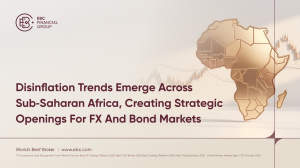Disinflation Trends Emerge Across Sub‑Saharan Africa, Creating Strategic Openings for FX and Bond Markets
EBC Financial Group analyses how diverging inflation and monetary signals in Nigeria, Kenya, and South Africa are shaping investor opportunities
NIGERIA, July 21, 2025 /EINPresswire.com/ -- As headline inflation continues to ease or stabilise across several major Sub‑Saharan African economies, EBC Financial Group (EBC) highlights how these varying trends are influencing central bank decisions and reshaping investor sentiment. With Nigeria registering its third consecutive month of slowing inflation, Kenya initiating a rate-cutting cycle, and South Africa maintaining price stability amid global uncertainty, traders and investors are reassessing their exposure in regional currencies, sovereign bonds, and inflation-sensitive assets.
“What we’re seeing is a macro rebalancing. Inflation is falling, but not uniformly, and that divergence is what’s creating the most interesting opportunities for traders,” said David Barrett, CEO of EBC Financial Group (UK) Ltd. “Kenya’s shift into easing is already impacting local bond yields, while Nigeria’s persistent real rates continue to draw capital flows. South Africa, meanwhile, remains stable for now, but sensitive to external risk. We’re watching closely how FX dynamics are unfolding as central banks respond at different speeds.”
“Africa is often viewed as a block, but markets here are increasingly differentiated—and understanding that distinction is essential for investors,” added Barrett. “Whether you’re looking at inflation, rates, or currency dynamics, it’s clear that this is a moment for selective exposure, not broad strokes.”
Nigeria’s Inflation Slows for a Third Straight Month as Monetary Tightening Holds
According to the Nigerian National Bureau of Statistics, headline inflation slowed to 22.22% in June 2025, down from 22.97% in May, marking its third consecutive month of decline. While still elevated regionally, this trend reflects the impact of the Central Bank of Nigeria’s sustained monetary tightening, which has kept its benchmark lending rate at 27.50% since May.
Meanwhile, the naira has maintained relative stability, closing around ₦1,518/USD last Monday, supported by FX reforms and tighter liquidity measures. Though Nigeria continues to report higher inflation than many peers, its consistent disinflation aligns with the broader downward trend seen across Sub‑Saharan Africa.
Kenya Enters Easing Cycle as Price Pressures Remain Contained
In contrast, Kenya’s inflation rate has held steady at 3.8% in June, comfortably within the Central Bank of Kenya (CBK)’s official target band of 2.5–7.5%, matching May’s reading and maintaining the decrease from an eight-month high of 4.1% in April.
In response to continued price stability and easing inflationary pressure, the CBK lowered its benchmark interest rate to 9.75% in June 2025—its sixth consecutive cut. This policy shift has fostered improved conditions for local bonds and supported the resilience of the Kenyan shilling.
South Africa Maintains Stability but Braces for Global Spillovers
South Africa’s inflation remained unchanged at 2.8% year-on-year in both April and May 2025, staying below the South African Reserve Bank (SARB)’s target range of 3–6%. While this reflects a stable price environment, SARB remains cautious due to the risk of external headwinds—including U.S. tariff threats and slowing economic activity in China—that could impact domestic inflation expectations.
The South African rand has traded with relative calm in recent weeks but continues to respond sensitively to shifts in global risk sentiment and commodity price movements.
IMF: Regional Inflation Trending Lower but Remains Uneven
According to the IMF’s April 2025 Regional Economic Outlook for Sub-Saharan Africa, the region has made significant progress in curbing inflation. Regional average inflation declined from 18.1% in 2024 to 13.3% in 2025 and is projected to stabilise at 12.9% in 2026, with continued moderation expected through 2026–2027.
The IMF attributes the downtrend to food price normalisation, exchange rate stabilisation, and fiscal consolidation. However, the report also highlights that disinflation remains uneven, with countries such as Ghana and Ethiopia still grappling with high price pressures linked to currency instability and elevated debt servicing costs.
Implications for Currency and Bond Market Positioning
EBC alerts investors that these varied inflation paths are leading to divergent monetary responses across the region. Nigeria remains under a tight policy stance; Kenya has begun to ease; and South Africa, while enjoying price stability, remains on high alert for external spillovers.
As a result, the Nigerian naira may continue to attract short-term interest, particularly if inflation moderates further. The Kenyan shilling has found footing amid easing policy conditions, while South African markets remain anchored but exposed to global volatility. In the fixed income space, bond yield curves in both Nigeria and Kenya are showing early signs of flattening, offering tactical opportunities for yield-seeking investors.
With inflation expectations adjusting and monetary conditions shifting, EBC observes that investor appetite is gradually moving away from inflation-linked instruments toward rate-sensitive assets, particularly in economies nearing a policy inflection point.
This information reflects the observations of EBC Financial Group and all its global entities. It is not financial or investment advice. Trading Contracts for Difference (CFDs) entail a substantial risk of swift financial loss due to leverage, rendering it inappropriate for all investors; thus, a thorough evaluation of your investment objectives, expertise, and risk appetite is imperative prior to engagement, as EBC Financial Group and its entities are not liable for any damages arising from reliance on this information.
For more insights and analysis on global market developments, visit www.ebc.com.
About EBC Financial Group
Founded in London’s esteemed financial district, EBC Financial Group (EBC) is a global brand known for its expertise in financial brokerage and asset management. Through its regulated entities operating across major financial jurisdictions—including the UK, Australia, the Cayman Islands, Mauritius, and others—EBC enables retail, professional, and institutional investors to access a wide range of global markets and trading opportunities, including currencies, commodities, shares, and indices.
Recognised with multiple awards, EBC is committed to upholding ethical standards and these subsidiaries are licensed and regulated within their respective jurisdictions. EBC Financial Group (UK) Limited is regulated by the UK's Financial Conduct Authority (FCA); EBC Financial Group (Cayman) Limited is regulated by the Cayman Islands Monetary Authority (CIMA); EBC Financial Group (Australia) Pty Ltd, and EBC Asset Management Pty Ltd are regulated by Australia's Securities and Investments Commission (ASIC); EBC Financial (MU) Ltd is authorised and regulated by the Financial Services Commission Mauritius (FSC).
At the core of EBC are a team of industry veterans with over 40 years of experience in major financial institutions. Having navigated key economic cycles from the Plaza Accord and 2015 Swiss franc crisis to the market upheavals of the COVID-19 pandemic. We foster a culture where integrity, respect, and client asset security are paramount, ensuring that every investor relationship is handled with the utmost seriousness it deserves.
As the Official Foreign Exchange Partner of FC Barcelona, EBC provides specialised services across Asia, LATAM, the Middle East, Africa, and Oceania. Through its partnership with United to Beat Malaria, the company contributes to global health initiatives. EBC also supports the 'What Economists Really Do' public engagement series by Oxford University's Department of Economics, helping to demystify economics and its application to major societal challenges, fostering greater public understanding and dialogue.
Michelle Siow
EBC Financial Group
+60 163376040
michelle.siow|ebc.com| |michelle.siow|ebc.com
Visit us on social media:
LinkedIn
Instagram
Facebook
YouTube
X
Other
Legal Disclaimer:
EIN Presswire provides this news content "as is" without warranty of any kind. We do not accept any responsibility or liability for the accuracy, content, images, videos, licenses, completeness, legality, or reliability of the information contained in this article. If you have any complaints or copyright issues related to this article, kindly contact the author above.
Discount Custom Cabinets Expands Multi-Family Cabinet Solutions to Meet Growing Developer Demand
Lakeith Kentrell Hudson Introduces Spiral Semantics: A Framework for Navigating Truth, Perception, and Duality
RF Filter Market to Witness Comprehensive Growth by 2031
Kalendarium
Więcej ważnych informacji
 Jedynka Newserii
Jedynka Newserii

 Jedynka Newserii
Jedynka Newserii

Konsument

Jednorazowe opakowania z plastiku mają do 2030 roku zniknąć z lokali gastronomicznych. Przekonanie klientów do pojemników wielorazowych może być wyzwaniem
Unijne przepisy zobowiązują firmy z branży HoReCa do ograniczenia w perspektywie 2030 roku jednorazowych opakowań z tworzyw sztucznych i zastąpienia choć części z nich opakowaniami wielorazowymi. Choć wielu Europejczyków pozytywnie odnosi się do oferowania opakowań wielorazowych przez lokale gastronomiczne, zaangażowanie użytkowników w zwrot pojemników może się okazać wyzwaniem.
Handel
Zbliża się szczyt UE–Chiny. Głównym tematem spotkania będzie polityka handlowa, w tym cła

Unia Europejska i Chiny odpowiadają łącznie za niemal 30 proc. światowego handlu, ale Europa wciąż ma ogromny deficyt handlowy w wymianie z Państwem Środka. Ostatnio relacje między Pekinem a Brukselą były pełne napięć, choćby w kwestii europejskich ceł na elektryki, chińskich ograniczeń eksportu metali ziem rzadkich, czy braku równowagi w dostępie do rynków. Szczyt UE–Chiny odbędzie się ponad półtora roku po poprzednim.
Polityka
Dane statystyczne pomogą przyspieszyć rozwój turystyki. Posłużą również do promocji turystycznej Polski

Główny Urząd Statystyczny we współpracy z resortem turystyki buduje nowoczesny portal analityczny Turystyka+. To interaktywne narzędzie, które umożliwia śledzenie zmian i porównywanie danych. Celem projektu jest wsparcie rozwoju turystyki na wielu poziomach – nie tylko krajowym, ale również lokalnym i regionalnym. Ma on być pomocny zarówno w podejmowaniu decyzji politycznych dotyczących infrastruktury turystycznej, jak i dla przedsiębiorców, co ma się przełożyć na rozwój sektora i gospodarki.
Partner serwisu
Szkolenia

Akademia Newserii
Akademia Newserii to projekt, w ramach którego najlepsi polscy dziennikarze biznesowi, giełdowi oraz lifestylowi, a także szkoleniowcy z wieloletnim doświadczeniem dzielą się swoją wiedzą nt. pracy z mediami.









.gif)

 |
| |
| |
|